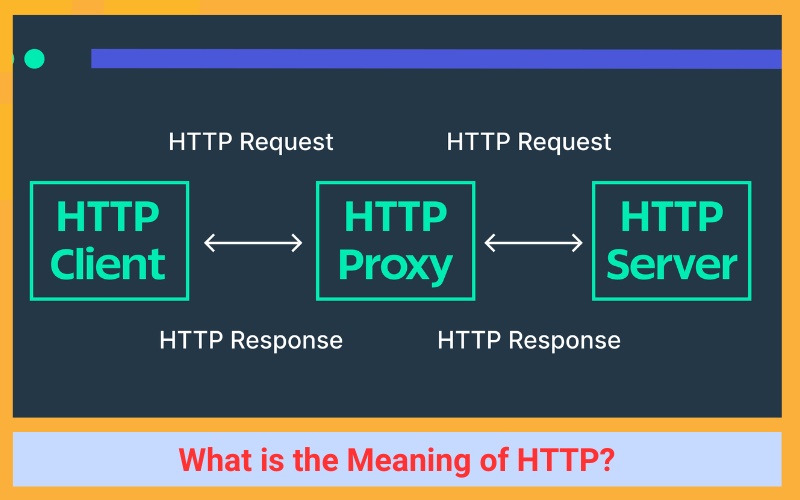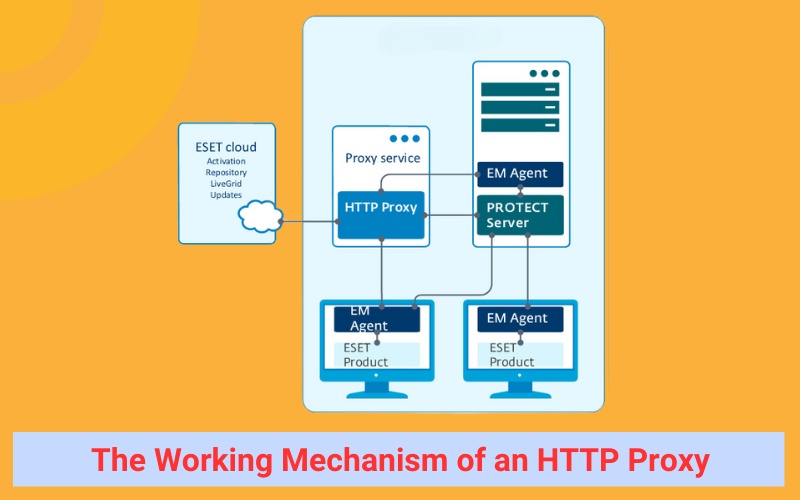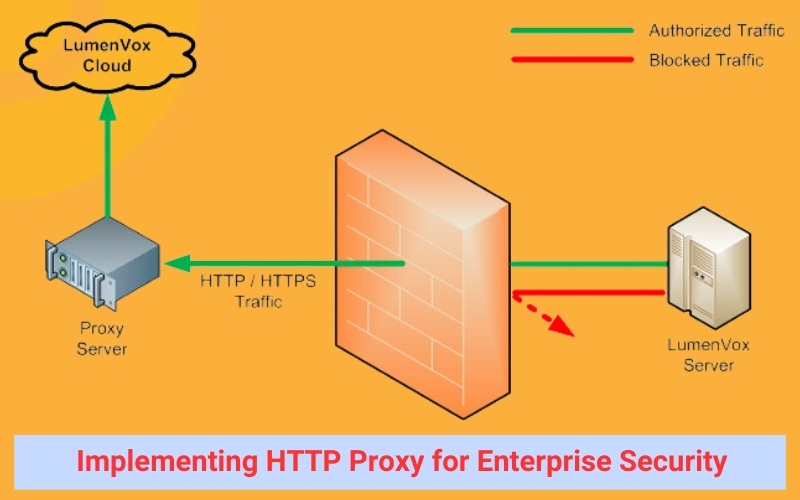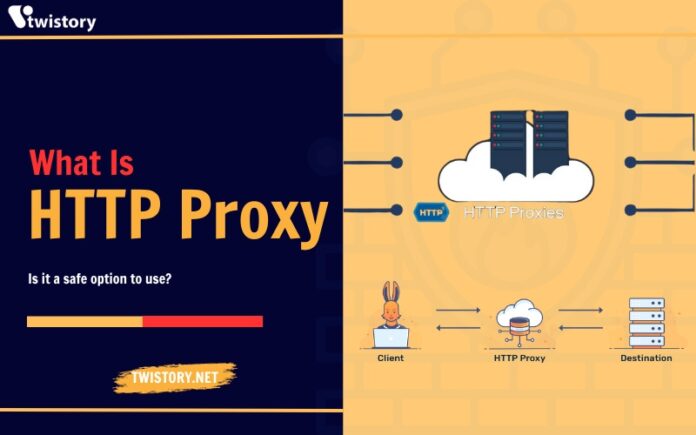The Hypertext Transfer Protocol, or HTTP, was designed in the 1990s and serves as the foundation for all data exchange on the internet. Over the years, this protocol has evolved and expanded, making it an integral part of today’s Internet. This article will elucidate the concept of an HTTP proxy, its operation, and the benefits that different configurations can offer. What is HTTP?
HTTP Proxy Explained: An Overview
An HTTP proxy operates as a high-performance content filter for the traffic received by the HTTP client and server. The HTTP proxy protocol routes client requests from the web browser to the internet and supports rapid data caching. All traffic processed by the server will appear from the IP address of the proxy instead of the user’s IP address.
What Does HTTP Stand For?
The Hypertext Transfer Protocol (HTTP) is an application-level protocol used to facilitate file exchange on the World Wide Web. HTTP is present at the beginning of every Uniform Resource Locator (URL) or web address on the internet. Designed to make the web faster and more efficient, it operates on the Transmission Control Protocol/Internet Protocol (TCP/IP) and Google’s QUIC protocol.

HTTP allows web browsers to send requests and communicate with web servers. The concept of HTTP was proposed in 1989 by Tim Berners-Lee, the inventor of the World Wide Web. The original version, HTTP/1.0, was stateless and executed each client request independently. This means that when a transaction is completed, the connection between the server and the browser is terminated. It has become more complex since the latest version, HTTP/3, based on the QUIC protocol.
HTTP does not have inherent security measures, so from 2010 onwards, websites have used HTTP Secure (HTTPS). HTTPS adds the Secure Sockets Layer (SSL) protocol to HTTP to encrypt communication between the browser and the server.
The Definition of a Proxy
A proxy refers to an entity authorized to act on behalf of another, and in the digital world, this role is performed by a proxy server. This server acts as a gateway between the user and the internet, preventing access from anyone outside the network. Regular internet access through a web browser allows users to connect directly with websites. However, a proxy serves as an intermediary, communicating with websites on behalf of the user.
When a computer connects to the internet, it uses an IP address to tag outgoing data with a return address. Similarly, a proxy—be it private or open—functions as another computer on the internet with its own IP address. The user’s browser connects to the proxy, which then forwards traffic to the website they are visiting, receives the response, and sends it back to the user.
The Working Mechanism of an HTTP Proxy
As cyber threats become increasingly complex and numerous, businesses and users require tools to stay safe online. HTTP proxy servers scrutinize web traffic to identify and block malicious activities or content, making them a highly effective choice for filtering out suspicious operations.
A good example of an HTTP proxy is one that thoroughly examines the source of web traffic before allowing it to access internal web clients. This reduces the risk of harmful content infiltrating the company network and prevents serious network incidents such as buffer overflow attacks. HTTP proxy servers can also be customized to create rules according to the specific requirements of a business.

Advantages and Disadvantages of HTTP Proxy
Advantages of HTTP Proxy
- Anonymity and Privacy: HTTP proxies mask your IP address, making it challenging to track your online activities. They are beneficial for accessing geo-restricted content or bypassing censorship.
- Content Filtering and Security: HTTP proxies can block undesired websites or content, enforcing organizational policies or parental controls. They can also scan for malware and other threats, enhancing security.
- Performance and Caching: HTTP proxies can cache frequently accessed content, reducing bandwidth usage and loading times. They can also compress data, further enhancing performance.
- Access to Restricted Content: HTTP proxies can bypass firewalls and filters to access blocked websites or services.

Disadvantages of HTTP Proxy
- Potential Slowdowns: HTTP proxies can introduce latency or slow down connection speeds, especially if the proxy server is overloaded or located far away.
- Security Concerns: Unreliable proxies can log your traffic or inject malicious content. It’s crucial to use reputable proxy providers with robust security measures.
- Compatibility Issues: Some websites or applications may not function correctly with proxies. Optimal performance may require configuration adjustments.
- Potential Legal Issues: Using proxies to circumvent copyright restrictions or engage in illegal activities could lead to legal consequences.
Implementing HTTP Proxy for Enterprise Security
One of the major benefits of using an HTTP proxy is the protection of user data and browsing activities. Here’s how an HTTP proxy can be utilized for business purposes:
Privacy Considerations
HTTP proxies allow businesses and users to conceal their actual IP addresses, ensuring privacy and preventing anyone from tracking their activities.
Security Measures
HTTP proxies help businesses detect and block suspicious traffic, protecting web servers from external cyber attacks. Companies can also implement HTTP proxies on their public web servers to prevent users from storing illegal files on their servers.
Content Limitations
Businesses can use HTTP proxies to restrict the type of content that accesses their network based on source domain, path name, file name, or URL extension. The caching capability of HTTP proxies helps reduce the number of ads users receive, allowing organizations to access ad-heavy websites, such as news sites.

Enhancing Connection Speeds
HTTP proxies allow simultaneous access to the same connection, making it an effective tool for large organizations.
Overcoming Internet Filtering
HTTP proxies can be used to circumvent internet and website filters. This allows users to evade control measures and security filters blocking access to banned websites. HTTP proxies are also useful for web data collection and web scraping.
Conclusion
In conclusion, the Hypertext Transfer Protocol (HTTP) and HTTP proxies play a crucial role in the digital world. They not only facilitate seamless data exchange on the internet but also offer numerous benefits such as enhanced privacy, improved security, and efficient content filtering. However, like any technology, HTTP proxies come with their own set of challenges, including potential slowdowns and security concerns. Understanding “What is HTTP Proxy” and its implications can help businesses and users navigate the digital landscape more safely and efficiently.
We hope you found this article informative and insightful. For more such interesting content, don’t forget to check out our other articles at Twistory. We strive to make complex concepts accessible and appealing to everyone.
>>See more related articles
- What is a Distorting Proxy? Its Mechanism and Applications
- What is an Anonymous Proxy and How Does It Operate?
- How to Use cURL with Proxy: The Best Tips and Tricks


